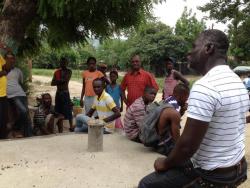Phase 2: Ensure the sustainability of clean water
 Thanks to the success of the chlorinators installed by International Action during Phase 1, many Haitians living in the Artibonite Region have access to clean, safe water. But for how long? We want to ensure our communities have a clean water supply for years to come. At the moment, the communities in the Artibonite Region rely on the delivery of chlorine from International Action. In Phase 2 of the Artibone Project, we will train elected community leaders to manage the water chlorination independently, providing a sense of ownership and pride that spreads far beyond the water they drink.
Thanks to the success of the chlorinators installed by International Action during Phase 1, many Haitians living in the Artibonite Region have access to clean, safe water. But for how long? We want to ensure our communities have a clean water supply for years to come. At the moment, the communities in the Artibonite Region rely on the delivery of chlorine from International Action. In Phase 2 of the Artibone Project, we will train elected community leaders to manage the water chlorination independently, providing a sense of ownership and pride that spreads far beyond the water they drink.
How does it work? Members of a locally elected water committee will decide on a donation amount that families using the water will contribute if they are able. This will generate just enough funds to buy more chlorine, as well as for general maintenance and repairs. Committee members can then purchase chlorine tablets themselves through a Haitian-run Chlorine Distribution System in Port-au-Prince (learn more). By taking on responsibility for the water supply, communities will become empowered so they no longer have to rely on aid but can count on a sustainable source of clean water for their children.
Has it been done before? Yes! The water stations we helped to create in Port-au-Prince are all run by elected members of the community who we trained after installing the chlorinators. Now, the water stations produce enough money to fund the purchase of chlorine, closing the loop of sustainability! We can build on this success by using these communities as a model. In addition we have partnered with local civil society groups such as the Rotary Club to provide extra support, ensuring the sustainability of the water committee structure in these communities.
What needs to be done? In 2014, International Action installed tanks and chlorinator systems in five communities in the Artibone region. Currently, these are used by local schools and churches but when the water committees take over, everyone in the community will be able to purchase water, providing access to 16,000 Haitians. The next steps are:
- Build a fence around each water supply to make it secure
- Hold community events to explain the process
- Support the election of water committees
- Train the technicians in water chlorination and finance.
How Can You Help? By donating today, we can go ahead with Phase 2 and ensure the sustainability of clean water in Haiti. Your contribution can help in the following ways:
$10 will provide community engagement for two people
$25 will train one community worker in water-management and finance
$50 will provide a testing kit so the community worker can test the chlorine level
$200 will provide a fence to make sure the water tap is secure
See our global giving page for more information on budgeting and the community-funding structure.
